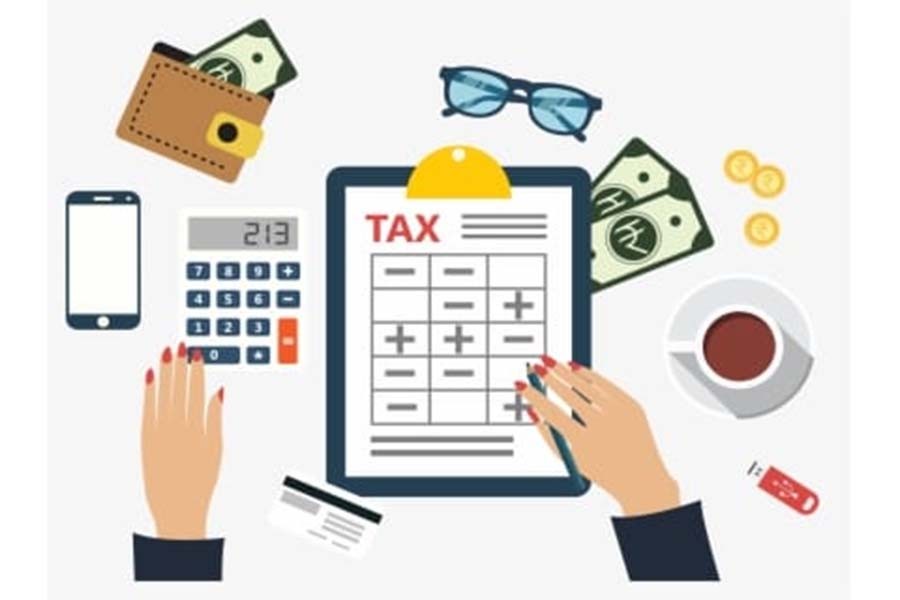Bangladesh's corporate-tax receipt stays low, around 1.6 per cent of GDP, despite charging one the highest rates in the region, a study shows to trace reasons for rising inequalities in society.
The average corporate income-tax yield remained below Tk 15 million per company until 2019-20, before rising above Tk 20 million in 2020-21, says the study report presented Wednesday, indicating that high rates result in revenue leaks.
Dr Mohammad Abdur Razzaque, chairman of Research and Policy Integration for Development (RAID), presented the study findings at a policy dialogue on 'Using direct taxation to tackle inequality and boost revenue'. Prof Dr M Abu Eusuf, Executive Director of RAPID and teacher at Dhaka University, moderated the programme held at BRAC Center Inn in Dhaka.
Former chairman of the National Board of Revenue (NBR) Dr Muhammad Abdul Mazid, MM Fazlul Haque, Director-General of BCS (tax) Academy, Dr Mohammad Abu Yusuf, joint secretary (budget), Finance Division of the Ministry of Finance, Md Anwar Hossain, joint secretary at Economic Relations Division (ERD), among others, spoke on ways of taxing as a tool for raising higher revenues and alleviating rising inequalities in society.
Corporate-tax rates in Bangladesh range from 12 per cent for readymade garment and some other manufacturing sectors to as high as 45 per cent for non-publicly traded mobile-phone companies.
Dr Razzaque said low public expenditures and rising inequality could be minimized through proper use of direct taxation.
Citing an example from Household Income-Expenditure Survey (HIES) data, he said the income share of the bottom 40 per cent of the population fell from over 17 per cent in the 1990s to 13 per cent in 2016.
And the income share for the bottom 5.0 declined from 1.03 per cent to just 0.23 per cent, as shown in the HIES report, rendering the poor poorer.
Dr Razzaque points out that revenue mobilization and public expending have implications for inclusive growth. Fiscal space is "shrinking" due to low public expenditure, fueling inequality.
Bangladesh has low government expenditure-GDP ratio--only 15 to 16 per cent of GDP as against developing-country average of 23 per cent of GDP, he said.
"There is a massive opportunity to address the above two issues-low public expenditure and inequality---with one single policy instrument," he adds.
Describing the state of personal and corporate taxes in Bangladesh, Dr Razzaque said the average revenue per individual taxpayer was 0.1 million in 2020-21 in a year, down from .24 million in 2015-16.
He, however, appreciates the recent policy direction of the government to reduce dependency on indirect tax and increase the ratio to 70:30 per cent from the existing 35:65.
Indirect tax has disproportionately higher burden on low-income households, thus further aggravating the inequality situation, the study shows.
Lowest-income group pays 7.3 per cent of their household income as indirect tax while higher-income group pays 1.02 per cent.
The study finds that direct tax contributes only 2.6 per cent to the country's GDP--one of the lowest in this region.

"Bangladesh has not benefitted from the existing progressive income-taxation structure and the rapid growth of the economy due to narrow tax net," it is stated in the presentation.
Until 2020-21, some 15,000 individuals had paid Tk 6 billion as wealth surcharge.
"Is it rational to see only 15,000 individuals capable of paying wealth surcharge?" Dr Razzaque questions in the presentation on taxing paradoxes.
The think-tank suggests two potential interventions--conducting socioeconomic survey and a business-prospect survey.
Also, it recommends rationalizing and reviewing tax exemptions and incentives.
Former NBR chairman Dr Mazid said culture of tax exemption should come to an end in the case of megaprojects as payment of taxes ensures transparency.
He suggests reviving the institutions like tax-ombudsman office for the sake of accountability in tax offices' services.
BCS (tax) Academy DG Mr Haque underscored the need for building capacity of the revenue board and imparting training to the taxmen for ensuring better services.
Finance division joint secretary Dr Yusuf noted that the digitisation effort of direct-tax wing remained fragmented while the NBR was yet to make transfer-pricing cell active.
He laid emphasis on investing in the manpower and logistics development of NBR to get output.
The finance official suggests that the minimum wage be increased to help bridge gaping inequality by way of raising earnings of low-income group.
ERD joint secretary Mr Hossain said Bangladesh is at a juncture where capitalizing on the direct-tax potential can lead to massive gains, ensuring sustainable LDC graduation and timely attainment of SDGs.
"The willingness of insiders of the tax department is important for making reform initiative successful," he says.
RAPID executive director Dr Eusuf said inclusive growth should be prioritized to mobilize resources for spending more in health and education.


